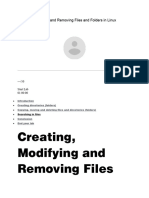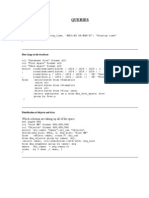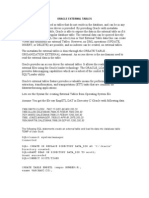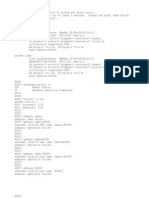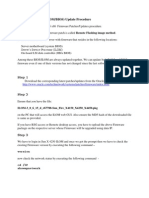Delete Files Procedure On Linux
Uploaded by
Biswajit DasDelete Files Procedure On Linux
Uploaded by
Biswajit DasDelete Files Older Than x Days on Linux
The find utility on linux allows you to pass in a bunch of interesting arguments, including one
to execute another command on each file. Well use this in order to figure out what files are
older than a certain number of days, and then use the rm command to delete them.
Command Syntax
find /path/to/files* -mtime +5 -exec rm {} \;
Note that there are spaces between rm, {}, and \;
Explanation
The first argument is the path to the files. This can be a path, a directory, or a
wildcard as in the example above. I would recommend using the full path, and make
sure that you run the command without the exec rm to make sure you are getting the
right results.
The second argument, -mtime, is used to specify the number of days old that the file
is. If you enter +5, it will find files older than 5 days.
The third argument, -exec, allows you to pass in a command such as rm. The {} \; at
the end is required to end the command.
This should work on Ubuntu, Suse, Redhat, or pretty much any version of linux.
You might also like
- 15 Most Useful Linux Commands For File System MaintenanceNo ratings yet15 Most Useful Linux Commands For File System Maintenance6 pages
- Experiment 11 Aim: Searching: Search File or Directory in Directory Structure Using Find and Locate CommandNo ratings yetExperiment 11 Aim: Searching: Search File or Directory in Directory Structure Using Find and Locate Command32 pages
- Experiment 11 Aim: Searching: Search File or Directory in Directory Structure Using Find and Locate CommandNo ratings yetExperiment 11 Aim: Searching: Search File or Directory in Directory Structure Using Find and Locate Command30 pages
- How To Find Anything Under Linux: Find Largest or Newest FilesNo ratings yetHow To Find Anything Under Linux: Find Largest or Newest Files4 pages
- A Unix/Linux Find Command Tutorial: Locating FilesNo ratings yetA Unix/Linux Find Command Tutorial: Locating Files7 pages
- Lec - Unit 13 - Finding and Processing FilesNo ratings yetLec - Unit 13 - Finding and Processing Files14 pages
- 8975a3cc-1915-4ada-8a87-205fc39b42c4_Linux_sessionNo ratings yet8975a3cc-1915-4ada-8a87-205fc39b42c4_Linux_session12 pages
- Bash - Delete Files Older Than 10 Days Using Shell Script in Unix - Stack OverflowNo ratings yetBash - Delete Files Older Than 10 Days Using Shell Script in Unix - Stack Overflow2 pages
- Find command files and Directories linuxNo ratings yetFind command files and Directories linux14 pages
- Micro - Project - Linux Milan Pratik PrasenNo ratings yetMicro - Project - Linux Milan Pratik Prasen16 pages
- How To Remove A Directory in Linux - NixcraftNo ratings yetHow To Remove A Directory in Linux - Nixcraft8 pages
- A Unix/Linux Find Command Tutorial: Locating FilesNo ratings yetA Unix/Linux Find Command Tutorial: Locating Files6 pages
- A-Monitoring System Resources Using Linux Commands 1710677957No ratings yetA-Monitoring System Resources Using Linux Commands 171067795717 pages
- Monitoring System Resources Using Linux CommandsNo ratings yetMonitoring System Resources Using Linux Commands17 pages
- How to list only files and not directories of a directory Bash_ - Stack OverflowNo ratings yetHow to list only files and not directories of a directory Bash_ - Stack Overflow8 pages
- Unit - 5 UNIX / Linux - File System Basics: Directory StructureNo ratings yetUnit - 5 UNIX / Linux - File System Basics: Directory Structure41 pages
- 5 Useful Shell Scripting Automation Use-Cases-1No ratings yet5 Useful Shell Scripting Automation Use-Cases-111 pages
- Solaris Service Management Facility: Modern System Startup and AdministrationNo ratings yetSolaris Service Management Facility: Modern System Startup and Administration12 pages
- Ten Most Frequently Used Linux Networking ServicesNo ratings yetTen Most Frequently Used Linux Networking Services6 pages
- Configure and Install HP Proliant With Redhat Linux EnterpriseNo ratings yetConfigure and Install HP Proliant With Redhat Linux Enterprise13 pages
- Backing Up Solaris (TM) ZFS File SystemsNo ratings yetBacking Up Solaris (TM) ZFS File Systems3 pages
- Backing Up Solaris (TM) ZFS File SystemsNo ratings yetBacking Up Solaris (TM) ZFS File Systems3 pages
- MTS Settings For Ubuntu 12.04: and Then Create The File /etc/wvdial - ConfNo ratings yetMTS Settings For Ubuntu 12.04: and Then Create The File /etc/wvdial - Conf2 pages




















